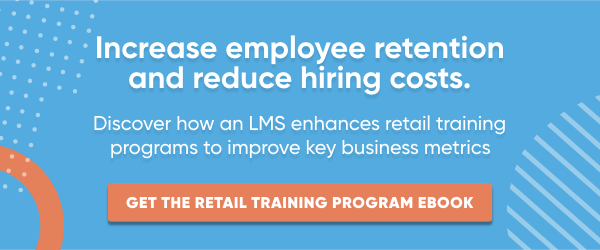Because of the coronavirus pandemic, many industry-specific obstacles have surfaced for financial services training. Onboarding new hires effectively is a common challenge for the financial service industry, but COVID-19 has compounded the problem. Contributing factors to this obstacle can include outdated or insufficient eLearning technology, limited training content, learner disengagement with training, and lack of compliance training. Financial institutions can overcome each of these barriers using a few tips.

3 Tips for Effectively Onboarding
Financial Services Employees Remotely
Here are a few ways you can ensure your company’s onboarding process fully prepares new hires for their roles as the COVID-19 crisis plays out:
1. Launch eLearning with an LMS
The first step to providing impactful onboarding is to launch online learning with a learning management system. eLearning allows new hires to onboard remotely, which has become the new normal for many companies. An eLearning system not only enables remote online training, but it also facilitates mobile learning, which increases engagement with training and quickly upskills workers with any competencies they are lacking.
A learning management system is more than just a vehicle for financial services training. It is also a tool that increases the visibility of metrics for company leaders. This allows administrators to accurately report on knowledge gaps and create training accordingly. Also, learning management systems often feature multiple training content libraries, allowing organizational leaders to broaden training content and tailor their company’s onboarding program to meet the needs of new hires. These are just a few of the benefits of an LMS.
Learn more: How to Quickly Launch an eLearning Program During the Coronavirus Crisis
2. Design a roadmap for success
One of the reasons onboarding programs across all industries fail is because they don’t help new hires build their network within the company, which can result in disengagement with the employer as well as with the program. By creating a roadmap for success that connects employees to the right people, companies can help new hires make a successful transition into their roles.
“(A roadmap for success) that stretches out several weeks can help connect new employees with other individuals they should know to build their internal networks while remote,” according to The Enterprisers Project.1 “This also helps them learn more about the company by talking to employees in other departments and gain a deeper understanding of the roles and responsibilities of their colleagues.”
L&D and HR can work together to develop a unique roadmap for success for each department within the company. Using a banking institution as an example, roadmaps to success would need to be created for departments such as Credit Operations, Direct Banking, Loan Operations, and Trade Operations and Support.
3. Create a flexible, generous timeline for onboarding
COVID-19 has made remote onboarding a necessity for most industries, and this will remain a trend until the pandemic is well-controlled and possibly beyond. “With the pandemic prompting millions to work from home, a new hire’s first weeks might look very different than they would have previously,” explained BizJournal.com.2 Because new hires will be onboarding and working from home, possibly on a schedule they decide, giving them a flexible timeframe for completing an online onboarding program will be helpful to them.
The onboarding program should be flexible, as well as generous. Quoting Vladimir Shifrin, technical director at Armix Group, HRDive.com reported, "Fully onboarding and integrating an employee so they understand the ins and outs of the organization can take up to six months.3" Giving new hires the time they need to adjust to their role remotely may reduce turnover and prevent them from feeling rushed.
Add Regulatory Compliance Training to
Your Onboarding Program to Increase Efficacy
Onboarding isn’t the only area of financial services training that is challenging for companies. “There are also challenges presented by rapidly evolving regulatory frameworks and audits, which require equally rapid and effective training,” stated TrainingIndustry.com.4 To address this issue, regulatory compliance training should be included early on in a new hire’s onboarding program, and customer training that touches on regulatory compliance issues should also be offered.
eLearning has never been more valuable than it is now, and it is the best investment you can make for your company. To get online learning up and running rapidly, learn more about the TOPYX Quick Start Program for financial services companies. The TOPYX learning management system features pre-built content to support remote workers and develop skills.
Sources:
1. https://enterprisersproject.com/article/2020/4/virtual-onboarding-best-practices
2. https://www.bizjournals.com/bizwomen/news/profiles-strategies/2020/04/got-new-hires-heres-how-to-make-remote-onboarding.html?page=all
3. https://www.hrdive.com/news/tips-for-onboarding-new-hires-remotely-during-covid-19-pandemic/575628/
4. https://trainingindustry.com/articles/sales/training-challenges-for-the-financial-services-industry/








